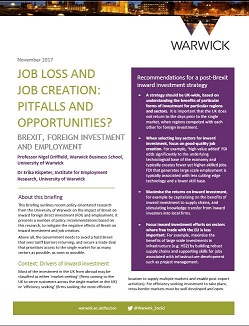Warwick experts analyse how inward investment is likely to be affected by Brexit

- Job Loss and Job Creation – Pitfalls and Opportunities? evaluates the importance of inward investment to the UK economy, and sets out policy recommendations for a post-Brexit industrial strategy.
- Inward investors have 40 per cent higher productivity and pay 20 per cent higher wages than the average for UK firms.
- Inward investment is associated with both innovation and export performance
- The paper is the second of four Warwick Brexit Briefings on Employment by the University of Warwick and its Connecting Research on Employment and Work (CREW) network.
The University of Warwick has published the second in a series of briefings exploring the implications of Brexit for the job market, workers’ rights, and employment policy.
Job Loss and Job Creation – Pitfalls and Opportunities? summarises recent research from the University of Warwick on the likely effects of Brexit on inward foreign direct investment (FDI); on the complex interrelationships between inward FDI and employment restructuring; and makes research-led policy recommendations for a post-Brexit industrial strategy.
The paper was written by Professor Nigel Driffield from Warwick Business School and Dr Erika Kispeter from the University of Warwick Institute for Employment Research. It finds:-
- Compared to other G7 countries, the UK has the highest percentage of inward FDI as a proportion to GDP, at 64 per cent of GDP.
- Firms that have come to the UK to sell into the single market from outside, such as Japanese car-makers, seek uncomplicated tariff-free trade with the EU.
- Investors operating supply chains that cross between the UK and the EU will face challenges if the UK leaves the customs union.
- The depreciation in the pound has attracted inward investment in the short term from investment vehicles looking to acquire cheap assets, but recent data suggest this is being choked off.
- A post-Brexit FDI strategy should be UK-wide, and be part of a broader economic policy which considers local and regional economies as a whole and supports good-quality job creation.
Commenting on his paper, Professor Driffield said: “Inward investment is of vital importance to the UK economy, not least because of the employment opportunities foreign firms create, often in areas of high unemployment. Foreign firms are also the most productive, and on average, the best paying firms in the UK.
“What inward investors, and indeed all firms, like is stability and certainty, and what we have at the moment is the opposite.
“It is important that the UK does not return to the days prior to the single market, when regions effectively competed with each other for foreign investment. Nor do we want to see a ‘race to the bottom’ competitiveness in the labour market. It is not enough simply to create jobs - better jobs are needed. ”
Professor Chris Warhurst, Director of the Warwick Institute for Employment Research and a member of the CREW Management Committee, added: “The Warwick Brexit Briefings on Employment are designed to help policymakers navigate the monumental task of disentangling UK and EU employment regulation, and designing a wholly new UK system.
"We hope these briefings will be a valuable, reliable contribution to the policy debate and will also help employers and industry bodies make well-informed decisions about the future."
Each of the Warwick Brexit Briefings on Employment has been written by experts from the University’s Connecting Research on Work and Employment (CREW) network and reflects current Warwick research.
The first briefing covered migration and skills. Future papers will address unemployment and training, and employment rights.
The briefing papers are presented to an invited audience of parliamentarians, employment organisations and other stakeholders in Westminster each week between now and 7 December, and will be free to download from the CREW website.
23 November 2017
Job Loss and Job Creation – Pitfalls and Opportunities? is published here.
More about the Warwick Brexit Briefings on Employment:
Organised by Warwick University’s: Business School, Institute for Employment Research, and Law School, the Warwick Brexit Briefings on Employment draw on existing Warwick expertise and research to put forward proposals for the development of employment policy as it is redesigned, post-Brexit, by the UK Government.
The policy issues covered will be those of unemployment and training, job creation and loss, migration and skills, and employment rights.
Each paper will be launched at a lunch-time briefing, taking place over four consecutive weeks in November and early December 2017 at the Westminster Central Hall, London, SW1H 9NH.
Contact:
Sheila Kiggins,
Media Relations Manager, Social Science
+44 (0) 7876 218166
+44 (0) 2476 150 423
s.kiggins@warwick.ac.uk
Click HERE to download the brief.
Useful links:
Related research:
